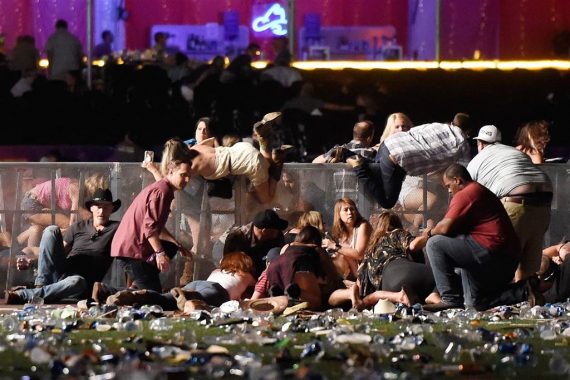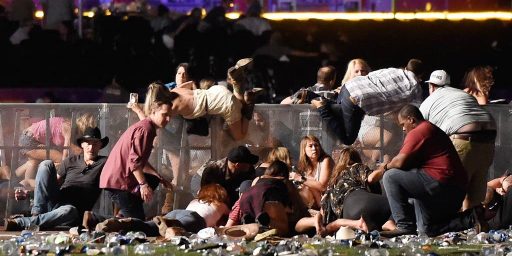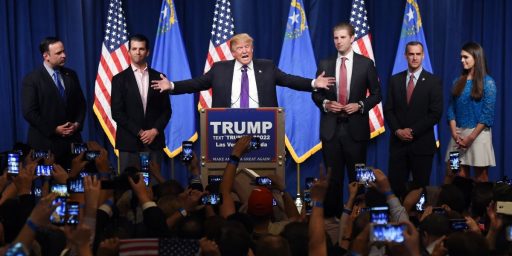The Las Vegas Shooting Was Terrorizing, But It Wasn’t A Terrorist Act
Stephen Paddock's crime was clearly terrorizing, and will impact the lives of survivors, families, first responders in many ways for a long time. Based on the currently available evidence, though, the Las Vegas shooting was not "terrorism."
As similar incidents have in the past, the mass shooting Sunday night in Las Vegas is generating a debate over whether or not the incident should be described as an act of terrorism and whether the shooter, Stephen Paddock, should be classified as a terrorist:
WASHINGTON — In the absence of any hint of a motive in the Las Vegas massacre, President Trump late Monday morning called it “pure evil.“Notably, he avoided the word “terrorism.”
The gunman, Stephen Paddock, a 64-year-old with no significant criminal history and no obvious ideological motive, remained a blank space, offering little for Americans who crave an explanation for the tragedy to seize upon.
But that did not deter a daylong jumble of industrious, contradictory and often self-interested speculation.
Early in the day, right-wing websites named the wrong man as the gunman, labeling him ”another angry far-left shooter,” in the words of the Gateway Pundit. A conservative Las Vegas radio personality, Wayne Allyn Root, told his 110,000 Twitter followers: “This is real thing. Clearly coordinated Muslim terror attack” — an early guess given a brief boost by a claim of responsibility from the Islamic State.
Then the F.B.I. knocked down the Islamic State angle, noting that the group has a history of false claims. The guessing game resumed: Was it a plot by ”deep-state Democrats“ (Alex Jones of the conspiracy site Infowars) or perhaps divine punishment for the ”profound disrespect“ shown to Mr. Trump and the national anthem (the religious broadcaster Pat Robertson)? Was it something to do with country music, given the concert crowd Mr. Paddock targeted? Could it be linked in any way to the long-ago history of Mr. Paddock’s father as a bank robber on the F.B.I.’s most-wanted list?
“Stephen Paddock motive” ranked high among Google searches, and it remained uncertain whether more evidence would fill the void about what drove his killing rampage or the slaughter would drift into history as one more act of American mass violence to elude easy categorizing.
Mass killing of innocents, even on the scale of Las Vegas, does not automatically meet the generally accepted definition of terrorism, which requires a political, ideological or religious motive. But beyond that academic analysis, in political debate in a polarized country, the word “terrorism” is also a verbal weapon, freely wielded — especially when the accused is Muslim.
“The label is so powerfully pejorative and carries so much weight,” said Martha Crenshaw, a terrorism expert at Stanford’s Center for International Security and Cooperation.
The first reports of any mass attack summon not only a general sense of grief, but anxieties and wishes in specific American subgroups: Muslim Americans pray that the attacker does not share their faith, for instance; conservatives and liberals alike want the assailant to turn out to be a member of their political opposition.
“In today’s political climate, it’s so polarized that people are hoping it’s not pinned on their side,” Ms. Crenshaw said. As a political progressive, she admitted to a passing feeling of dread on Monday that the gunman might come from the left.
More cynical observers of American politics may feel that Mr. Paddock’s advanced age, white race and non-Muslim religious background make it less likely that he will be tagged a terrorist, whatever may emerge about his politics.
(…)
The tussle over what terrorism is dates back to the beginning of its modern history, said David C. Rapoport, the dean of American historians of terror. He said a Russian radical who shot the governor of St. Petersburg in 1878, Vera Zasulich, was asked at trial why she laid down her gun after merely wounding her target.
“I’m not a criminal — I’m a terrorist,” she declared, he said, suggesting that she had made her political point and felt no need to pile on with lethal violence.
“That’s not our conception of terrorism,” said Mr. Rapoport, a retired professor at the University of California, Los Angeles, and founding editor of the journal Terrorism and Political Violence.
Mr. Rapoport’s well-known taxonomy identifies four major waves of terrorism since the 1880s: the anarchists; anticolonial activists; leftists around the time of the Vietnam War; and since 1979, religious zealots, including non-Muslims. He said each of the earlier waves lasted about 40 years, and that he expected the period of religious terrorism to fade by 2025.
But in every case, the perpetrators had a clear ideological agenda. They were also overwhelmingly young, Mr. Rapoport said. Mr. Paddock so far seems to fit none of the patterns. His age, a year short of qualifying for Medicare, is especially perplexing.
In the end, of course, what we call Paddock’s horrific crime hardly matters. Not calling it ‘terrorism’ won’t change the fact that 58 people are dead and more than 500 injured in what, at least in terms of the body count and casualties, the single worst shooting incident in American history and the worst single mass casualty incident since the September 11th attacks. In either case, those people will still be dead or injured and along with them hundreds if not thousands of people will have been impacted in some way either because they lost a friend or family member, or were injured, or were among the more than 20,000 people sent into a panic in the late hours of a Sunday evening concert where they were enjoying themselves one minute and running for their lives the next. Whether it’s called “terrorism” or not is really rather irrelevant to these people, and won’t change reality for them or anyone else impacted by Paddock’s crime or any similar incident.
Additionally, and as many people have pointed out in the wake of the Las Vegas shooting, there has been a tendency by the media and the public at large to use different labels for what essentially the same type of crime based on something as superficial as the identity of the shooter. This argument will point to the fact that individuals, authorities, and the media are often quick to refer to a particular act as an act of terror when the perpetrator when the attacker is revealed to have a Muslim or Muslim-sounding name while mass shootings committed by a white person or a person of some other ethnicity in different terms and by referring to issues such as mental instability or mental illness even before there is any of those factors may have played a role in the events that occurred. This is often a fair criticism, of course, and it’s one of the many reasons why authorities, the media, and members of the public should avoid jumping to conclusions in the wake of incidents like this. More often than not, initial reports end up being based on incomplete information, misinformation, misunderstanding, or outright fabrication. Unfortunately, in an era of the never-ending news cycle the old Winston Churchill line that a lie (or misinformation) can spread halfway around the world while the truth is still putting its pants on is even more true than it was in when radio was the predominant form of “mass media” and most people still relied on newspapers as a primary news source.
All that being said, though, it seems apparent that while all mass casualty incidents can be terrorizing in the sense that they display a level of violence and depravity that none of us can comprehend, not all such incidents are terrorist incidents, and that we should be careful in how we label these attacks.
Legally, for example, terrorism is clearly defined under both Federal law and state law. Section 2331 of the United States Code, for example, defines “terrorism” this way:
(1) the term “international terrorism” means activities that—
(A) involve violent acts or acts dangerous to human life that are a violation of the criminal laws of the United States or of any State, or that would be a criminal violation if committed within the jurisdiction of the United States or of any State;
(B) appear to be intended—
(i) to intimidate or coerce a civilian population;
(ii) to influence the policy of a government by intimidation or coercion; or
(iii) to affect the conduct of a government by mass destruction, assassination, or kidnapping; and(C) occur primarily outside the territorial jurisdiction of the United States, or transcend national boundaries in terms of the means by which they are accomplished, the persons they appear intended to intimidate or coerce, or the locale in which their perpetrators operate or seek asylum;
(…)
(5) the term “domestic terrorism” means activities that—
(A) involve acts dangerous to human life that are a violation of the criminal laws of the United States or of any State;
(B) appear to be intended—
(i) to intimidate or coerce a civilian population;
(ii) to influence the policy of a government by intimidation or coercion; or
(iii) to affect the conduct of a government by mass destruction, assassination, or kidnapping; and(C) occur primarily within the territorial jurisdiction of the United States
Nevada law defines “terrorism” in a somewhat broader way in Title 15 Section 202.4415 of the Nevada Code:
1. “Act of terrorism” means any act that involves the use or attempted use of sabotage, coercion or violence which is intended to:
(a) Cause great bodily harm or death to the general population; or
(b) Cause substantial destruction, contamination or impairment of:
(1) Any building or infrastructure, communications, transportation, utilities or services; or
(2) Any natural resource or the environment.
2. As used in this section, “coercion” does not include an act of civil disobedience.
A separate Nevada law defines a terrorist as ”a person who intentionally commits, causes, aids, furthers or conceals an act of terrorism or attempts to commit, cause, aid, further or conceal an act of terrorism.”
From these statutes, it seems fairly clear that Paddock’s act would not meet the definition of terrorism under Federal law because it does not at this time appear to be intended to intimidate or coerce civilians, government policy, or affect the conduct of government. Under the more broadly written Nevada statute, one could possibly make the argument that Paddock’s action would meet the definition, and it’s probable that he would have been charged with this crime had he survived the attack. Even there, though, it’s not clear from the precise wording of the statute that it was intended to cover a crime like Paddocks. Since courts have generally held that criminal statutes ought to be strictly construed rather than stretched to apply in situations where they were not intended, it is arguably inappropriate to apply the Nevada law to what he did.
Using a more conventional dictionary definition, ‘terrorism’ is defined by Merriam-Webster as “the systematic use of terror especially as a means of coercion.” More colloquially, it has come in recent decades to refer almost exclusively to attacks carried about by a person or persons for the purpose of achieving some other goal, a goal that could be inspired by politics, ideology, religion, or some similar over-arching philosophy. This would generally rule out cases such as the Virginia Tech shooting, the movie theater shooting in Aurora, Colorado, the Gabby Giffords shooting, or the shooting at Sandy Hook Elementary School. In those four cases, it soon became clear that one of the primary factors in the incident was linked to the shooter’s mental state and perhaps some triggering event rather than the desire to advance an agenda, support an organization like ISIS, or promote some political motive. Based on that colloquial definition, it would seem clear based on what we currently know that the Las Vegas shooting seems more likely to fall into the second category than the first.
This same question came up in the immediate aftermath of the shooting at a historic African-American church in Charleston back in 2015 by Dylann Roof. In the immediate days after the attack, we began to learn that Roof had a history of racist writings and that he had posted several pictures of himself with symbols typically adopted by white supremacists. Additionally, we learned soon after his arrest that Roof stated it was his intention to kill as many African-Americans as possible, and that he apparently intended to try to visit a second African-American church in the area that same night but decided to try to get away from authorities instead. For these reasons, it seemed fairly clear to me at the time that it was entirely proper to label Roof a terrorist notwithstanding the fact that he was apparently not connected to any wider organization.
To be fair, of course, we don’t know at the moment what exactly it was that motivated Stephen Paddock to blindly fire into a crowd of more than 20,000 people. There’s been much speculation regarding possible motives that include everything from gambling problems that led to a huge amount of debt to the casinos that he visited often, the aftermath of what may or may not have been a bitter divorce, and, of course, diagnoses of mental illness on the part of armchair psychiatrists and social media medical experts. At least according to the family members in Florida and neighbors in Nevada who have spoken to the media since yesterday, though, none of those factors seem to have been apparent in his life before Sunday night, although it’s possible that he was hiding his problems from his family and neighbors. Until we have information like that, any discussion of his motives would seem to be pure speculation. At the very least though, we can say that he apparently didn’t leave any kind of note behind that would indicate a political, ideological, or religious motivation and, unless one is found or other evidence supporting such a connection is found, it strikes me that it would be improper to label what he did an act of terror.







So the title of this post misleads. The reality is we do not know whether or not that was a terrorist act or not..
We don’t know and may never know, unfortunately.
@Franklin: @Franklin:
Why “unfortunately?” I do not see how it matters what his motive was – how does knowing that affect anything?
@charon:
The lawyers care. Some insurance policies have exceptions for acts of terrorism. Also, if the Secretary of Homeland Security were to declare the event to have been an Act of Terrorism, the provisions of the SAFETy Act(*) would kick in. Etc.
(*) A piece of back-door tort reform disguised as counter-terrorism law, passed as part of the Homeland Security Act that created DHS.
@charon:
The information could be useful; knowledge of motive sometimes helps prevent future catastrophes.
In any case, it’s human to want an explanation, particularly for horrendous acts.
We can’t call it terrorism, yet, simply because we don’t know the motivation.
Just to clarify…Trump would have already called it terrorism if the perp wasn’t a white guy.
The real terrorists are the Republicans, who find this loss of life perfectly acceptable based on fealty to the gun lobby.
Sidebar:
Jimmy Kimmel is becoming the voice of the American Public.
https://www.youtube.com/watch?v=ruYeBXudsds
As you go on to note, terrorism is defined repeatedly and inconsistently, sometimes clearly and sometimes not, under various federal and state laws. Which definition applies depends on a number of factors — where the incident happened, what question is being asked, etc. Most of these definitions (and questions of jurisdiction) have never been tested in court.
@charon:
Based on the currently available evidence, there is no basis to call the Las Vegas shooting terrorism.
@Liberal Capitalist:
No, he’s not. He’s a comedian, not a politician. Nor is he an expert on health care policy, guns, gun policy, or what constitutes terrorism.
People need to stop basing their opinions on important issues on what some guy with a TV show says. (And, yes, I realize the irony of saying that in the age of Trump but as everyone here knows I never believed he belonged in the Oval Office, to begin with)
@Doug Mataconis: Yes, he’s a comedian. That does not mean he’s unintelligent or ignorant or incurious.
I would 100% rather have Kimmel or Seth Meyers or John Oliver or Samantha Bee or Stephen Colbert as president than our current occupant.
Legally, it seems to me pretty clear that 1. (a) of the Nevada statute cited reads on this, while the (so far) apparent lack of a political motive would seem to mean this does not meet the federal statute. Wiktionary, I believe in common with other dictionaries, offers three definitions, each of which requires a political or religious motive. In vernacular usage, as Doug point out, ethnicity carries a lot of weight. After the whack job flew his plane into the TX IRS office one of the networks is reported as arguing whether to call it terror as no Muslim was involved. IIRC, they decided not to. I think it’s sensible to conclude that, like “conservative”, in the vernacular “terrorism” has lost all meaning.
I think we need to see this as a cultural manifestation. After decades of shoot-em-up movies and TV shows and shooter video games, maybe some of us don’t see targets as people. It seems fair to call Paddock, who had what, 20 to 40 guns, a gun enthusiast. Our modern gun culture goes a long way to say it’s OK to shoot people. It would be good if the NRA could go back to supporting hunting and marksmanship and opposing concealed carry. It would also be good if we could go back to the Dragnet era, when cop shows rarely involved a body count. I see no way to accomplish either. Maybe passing a few gun restrictions would go a small way toward sending a message that this crap is not all right.
Terrorism is a tactic and U.S. legal code in no way determines what is and is not definable as such. If Paddock did this to make other people afraid, he was a terrorist.
Doug, I’m not sure why you think it is a stretch to call it terrorism under Nevada law. This seems pretty cut and dried: 1.
Under federal statute, it seems pretty clear to me that the following are terrorists:
1) Pretty much anything done by the KKK to minorities
2) Pretty much anything done by white supremacists to minorities
3) Anti-abortion shooters and arsonists
4) The Olympic Bomber (who was also the Atlanta Gay Bar bomber)
Further, all but #2 should be considered to be Christian terrorists. Tfhe KKK starts and ends their meetings with Christian prayers and they literally chose cross burning as their preferred method of inflicting terror. The Anti-abortion murderers and arsonists have been all Christians as far as I know and have explicitly stated that they did this in Christ’s name. And the Olympic/Gay Bar bomber explicitly stated that he was doing this in the cause of his Christian fundamentalist religion, and was shielded and hidden from justice for a number of years by an embracing fundamentalist sect.
I’m just curious. Does anyone disagree?
There are a fair number of folks on the right talking about how this is the price we pay for a free and open society — see redstate right now, which is always about one echo behind the modern “conservative” echo chamber.
They weren’t talking like that when the perpetrators were a touch tan or brown. Then it’s terrorism, and we have to do something about terrorism.
But right now, they are actually kind of right — we live in a country awash with guns, and there’s no political will to get rid of them. Police powers are limited, so we are going to have mass murders from time to time, and more mundane murders every day. In a country where everyone has access to the means to kill other people quickly at a distance that’s bound to happen.
I differ from our right wing friends in that I think this same level of deference should be given to our brown and Muslim friends as well as white guys. We should make an effort to stop terrorists, just as we should make an effort to stop any crime, but we will never be 100% effective.
For instance, we should be bringing in refugees, even though some of them might be ISIS terrorists. We can keep an eye on them, and hopefully keep anything truly horrendous from happening. There is a risk, but we should accept that risk, and accept the refugees because it’s the right think to do, and because it’s kind.
Jimmy Kimmel has just as much right to be taken seriously as the likes of Roy Moore or Donald Trump or Chris Christie or Ted Cruz. He had a very sick kid who got treatment, he saw other families with sick kids who didn’t have the financial advantages he has, and he spoke out on their behalf. The ONLY difference between Kimmel and the others I named: Kimmel makes more sense.
@charon:
Charon is right…why he did it doesn’t matter because whatever the reason, nothing is going to change because of it.
Congress is beholden to the gun lobby and that’s the end of it.
Paddock had the right to kill 59 people and 59 people had no right to expect to be safe.
@Not the IT Dept.: Republicans are all “entertainers should just entertain” or “shut up and sing” until Kid Rock decides he wants to run for Senate.
@Doug Mataconis: “People need to stop basing their opinions on important issues on what some guy with a TV show says.”
Hmmm… John Stewart, Samantha Bee, John Oliver, Stephen Colbert, Trevor Noah and all their writers seem to reliably put together a more accurate picture of the situation than most politicians.
It’s a sad but reasonably true fact that comedy quite often provides more pertinent, reliable information and often provides a deeper historical context. Certainly better than many pundits and “news discussion shows”. Frontline and Vice are certainly better but often not sufficiently timely. There are a number of print news sources that are good but they have much less of a following.
@Liberal Capitalist: Along with Trevor Noah, Seth Meyers, Conan, Colbert, and James Corden according to my YouTube sidebar.
“perhaps divine punishment for the ”profound disrespect“ shown to Mr. Trump and the national anthem (the religious broadcaster Pat Robertson)?”
And then there’s Pat…
@Daryl’s other brother Darryl:
There appears to be a trend of mass shootings becoming more and more frequent. If that trend extends, it is conceivable that public pressure will build and will force the politicians to take action.
Sometimes things just reach a tipping point. Just a possibility.
@charon:
I do so wish you were correct…but if twenty 6 & 7 year old children can get mowed down in cold blood…and we don’t so much as raise a finger…we just never will.
@charon: What CSK said.
http://nymag.com/daily/intelligencer/2017/10/it-doesnt-matter-why-stephen-craig-paddock-did-it.html
@Gustopher:
I agree. I think people are either unable or unwilling to rationally assess risk. Even someplace like France, with all of its terrorist attacks, the odds of being killed in one is vastly less than the odds of any given American being killed in a fatal car accident.
But fear is a hell of a drug, so we get worked up over low-probability events….
Are you kidding? Shooting into a crowd of 22K civilians from on high isn’t intended to “intimidate”?
Let’s say the motive was revenge against the casinos for whatever. Shooting a sh^tton of people on their doorstep is intimidation and coercion. Let’s say the motive was shooting him some rednecks. Firing an automatic weapon from over 35 stories above isn’t an intimidation tactic to cause panic in the crowd? Let’s say the motive was he was listening to Johnny Cash, went to the wrong town just to shoot someone and watch them die. Almost 20 high powered weapons wasn’t an overwhelming show of force for intimidation? Regardless of motive, the very nature of the act is intimidating in and of itself towards the intended victims – civilians.
Just because there’s no specific verbiage regarding “death” or “injury” doesn’t preclude the terrorism charge as those are by-products of the action. Truthfully, terrorists don’t really want us DEAD, they want us AFRAID. “Intimidation” is in there because the death usually results from the intimidating act. Terror as a weapon is its own tactic and he used it to great success. It’s really parsing words to say this doesn’t meet the criteria.
@MarkedMan:
I don’t disagree, but I should add that, while the Klan have always identified as fundamentalist Protestant, and so they are a good analogue to a group like ISIS, not all white supremacists are Christians. Some are atheists, and some affiliate with a kind of Nordic neo-paganism (this is particularly common among neo-Nazis). Timothy McVeigh was an agnostic. The alt right tends to be secular (Richard Spencer is an atheist though he calls himself “culturally Christian”).
@Doug Mataconis:
As opposed to some guy with a blog?
@Kylopod: @MarkedMan:
Culturally Christian, ethnically “Christian”, is all the KKK, the alt-right, and many Evangelicals mean by Christian anyway. The tenets of their nominal faith have little or nothing to do with it.
@Liberal Capitalist:
FTFY.
@Kylopod:
Some alt-righters purport to worship the Norse gods. Jesus is altogether too forgiving for their tastes.
@KM:
What evidence do you have that it wasn’t intended simply to kill a lot of people? That’s also an established motive in historical cases. Killing (or even threatening to kill) a lot of people in order to scare/intimidate others is terrorism. Killing them in order for them to be dead, without really giving a crap whether that intimidates others, is not. Killing them because you’ve decided to kill yourself and want to take an honor guard with you is not. Killing them because the voices in your head told you to is not.
We simply don’t know in this case. (In truth, even if the killer had left a note, there’s no reason to think he’d have been honest about his motives in the note. Or even that he understood his own motives.)
Now, if your point is that our cultural fixation on whether or not an event was or was not terrorism is stupid, well… I’m not disagreeing with you.
@CSK:
These contradictions, it should be noted, go back to Nazi Germany itself. There’s a lot of confusion over what precisely the Nazis believed, and I frequently hear people distorting the matter, with conservatives tending to depict the Nazis as atheistic or pagan while liberals tend depict them as Christian. The truth is actually quite complicated. A number of the leading Nazis did in fact dabble in neo-paganism, while others promoted something they called “Positive Christianity,” an Orwellian term that actually meant replacing Christianity with a new Nazi religion centered around the Fuehrer and racial purity. Hitler himself was nominally a Catholic, but his actual religious views were highly unorthodox, where he more or less rejected Pauline Christianity as a Jewish distortion of the teachings of an Aryan Christ.
At the same time, Nazism would not have been possible were it not for the rich heritage of anti-Semitism bequeathed by the Roman Catholic Church and by Martin Luther. Nazism essentially brought Christian anti-Semitism to its logical extremes, to the point that it became incompatible with Christianity itself.
@CSK:
The white supremacists who find Jesus to be too forgiving for their tastes are the ones who read and understood the Bible. He was pretty much a “turn the other cheek”/”love thy neighbor” kind of guy, and that doesn’t fit too well into the white supremacy movement.
The argument is about what “terrorism” means.
I can see the point about it being important for insurance companies, since they have clauses dealing with terrorism, but why does it matter otherwise?
Killing 58 people isn’t made any better or any worse by adding/subtracting the label “terrorism”.
A little more on this:
@george:
The main reason is that “terrorism” has become something of a racially coded word. Just as when people use the term “working class,” there is often an implicit assumption they’re talking about white people only, the term “terrorist” is often implied to only include Muslims and/or nonwhites.
It’s partly a reflection of how the word evolved historically. The word “terrorist” is a couple of centuries old, but it didn’t acquire its modern sense until about the mid-20th century. (According to the Online Etymology Dictionary, one of the first groups to be described as “terrorist” in the modern sense were Jewish militants in British Mandate Palestine.) Whatever the official definition of the word, it has long carried a strong connotation of people who rebel against Western powers, and this has had the effect of making it a lot likelier to be applied to Radical Muslims than white nationalists. The Klan certainly fits the definition of a terrorist group–in fact it’s arguably the first real terrorist group in America–but that’s simply not what the word “terrorist” conjures up in a lot of people’s minds.
I think that’s the real reason people are fighting over whether to apply the T-word to the current shooting. However you choose to define the word, there’s a subtle bias in the way the word is applied.
@Hal_10000:
FTFY
@Kylopod:
That’s interesting. However it suggests that perhaps the word should be phased out, since it appears it doesn’t really mean anything except “people I don’t like who kill people I do like”.
Arguing about whether killer X is or is not a terrorist is just keeping a meaningless word alive. And
isn’t there some old saying about one person’s freedom fighter is another person’s terrorist?
@george: sometimes you’re a bit too, “let me be even-handed and understanding,” even when it doesn’t apply. For instance, this statement:
isn’t really accurate – or at least the second part isn’t. For instance, why did most rightwingers consider the Orlando nightclub shooting terrorism? The victims were gay and mostly Latino (it was Latino night at the club) – not people who righwingers generally have sympathy for.
No, they called that terrorism because the killer was Muslim, and had expressed some sympathy for ISIS.
On the other hand, most workplace shootings are labeled as such – unless the shooter is Muslim, as in San Bernadino and the military base in Texas. (Note: I don’t know for certain how those two shootings should be classified – as workplace violence or as terrorism – just that many were quick to label those acts of violence as terrorism, simply due to the religion of the shooter).
And your quote again – how does it apply in this situation? A white man killing other white people? People aren’t labeling it terrorism because they like or dislike either the killer or the victims.
Most of the disagreement on this thread has been whether the sheer act of perpetrating such terrifying violence makes an event terrorism, or whether the killer needs to have a definitive motive of killing for some political purpose. Kylopod’s point, which I have seen raised elsewhere, is that for much of the media and the public, neither the horror of the act nor the motive of the killer is the triggering factor. Instead, it’s the race/ ethnicity/ religion of the perpetrator. Indeed, this very article is a testament to that, since Doug wrote that it’s not terrorism, instead of “we don’t know whether it’s terrorism” – since we don’t yet know Paddock’s motive.
Ignoring all these concerns to play peacemaker — “let’s just get rid of the word, and it’ll all be peachy” — is naive.
There doesn’t seem to be a lot of information about this Paddock concerning his past, associations, background, and any previous problems. This has a certain “Lee Oswald” feeling about it.